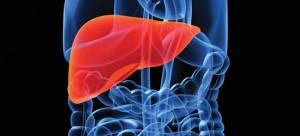
The liver can be found on the upper right side of the abdomen, just below your diaphragm. Did you know it is the largest internal organ of the human body and can weigh from 1.25kg to 1.5kg? It is responsible for many of the most important functions in your body.
So what does it do? Every day the liver filters your blood, removing waste products, drugs and other toxins. Blood from the digestive system goes through the liver first before it goes anywhere else in your body and harmful toxins are removed while essential nutrients are stored and distributed.
The liver also helps to regulate your metabolism and converts carbohydrates into glucose for energy and also into a storable form called glycogen. The liver is so clever that when your blood sugar levels drop, it converts glycogen back into glucose so you’ll have energy available to you again.
It also stores and supplies vitamins and minerals to your body where they are needed, produces bile (which is stored in the gall bladder and used to help break down dietary fats) and produces essential proteins, such as blood-clotting factors and enzymes.
Given the importance of your liver in keeping you healthy, there are some good reasons why it pays to avoid or cut down on the things that can do your liver damage.
There are some foods and toxins that can be harmful to your liver. Alcohol, cigarettes, marijuana, illicit drugs, fatty foods, high salt intake and high levels of saturated fats can all affect the liver. Heavy alcohol drinking, continuously over a long period of time, is one of the causes of alcohol-related liver disease.
According to DrinkWise Australia if you regularly drink excessively you can develop fatty liver. This is when fat accumulates inside the liver cells, causing cell enlargement and sometimes cell damage. The good news is that if you reduce your drinking, or stop altogether, your liver can recover.
“If you continue to regularly drink a heavy or excessive amount of alcohol, your liver may become inflamed, causing alcoholic hepatitis. This can result in liver failure and death. Alcoholic hepatitis is reversible if you stop drinking alcohol. However, continued drinking may then permanently scar and damage your liver, resulting in liver cirrhosis. This can be treated but is not reversible, and it increases your risk of liver cancer. If you stop drinking alcohol at this stage you may avoid liver failure and/or liver cancer,” DrinkWise advises.
There is a range of foods that can help the liver do its job. These include sulphur-rich foods, such as garlic, onions, eggs and red peppers, which help the liver to eliminate toxins. Vegetables like cabbage, cauliflower, broccoli and Brussels sprouts contain phytonutrients that are essential to the liver’s detoxification processes.
Here are some other good foods for the liver:
- Artichoke hearts These help with the secretion of bile and contain antioxidants that protect the liver cells.
- Asparagus A good source of vitamin A and potassium, which the liver needs to detox.
- B Vitamins Contained in whole grains and pulses, like oats and brown rice. These vitamins also help the liver detox.
- Beetroot Contains betaine, which protects the liver from alcohol.
- Magnesium One of the main nutrients that your liver needs to make enzymes to break down toxins. Good sources of magnesium are dark green, leafy foods, such as watercress, rocket and mustard greens.
- Water This is one of the most important ways to help your liver get rid of toxins (and one of the easiest!), so drink lots of water.
Comments are closed.